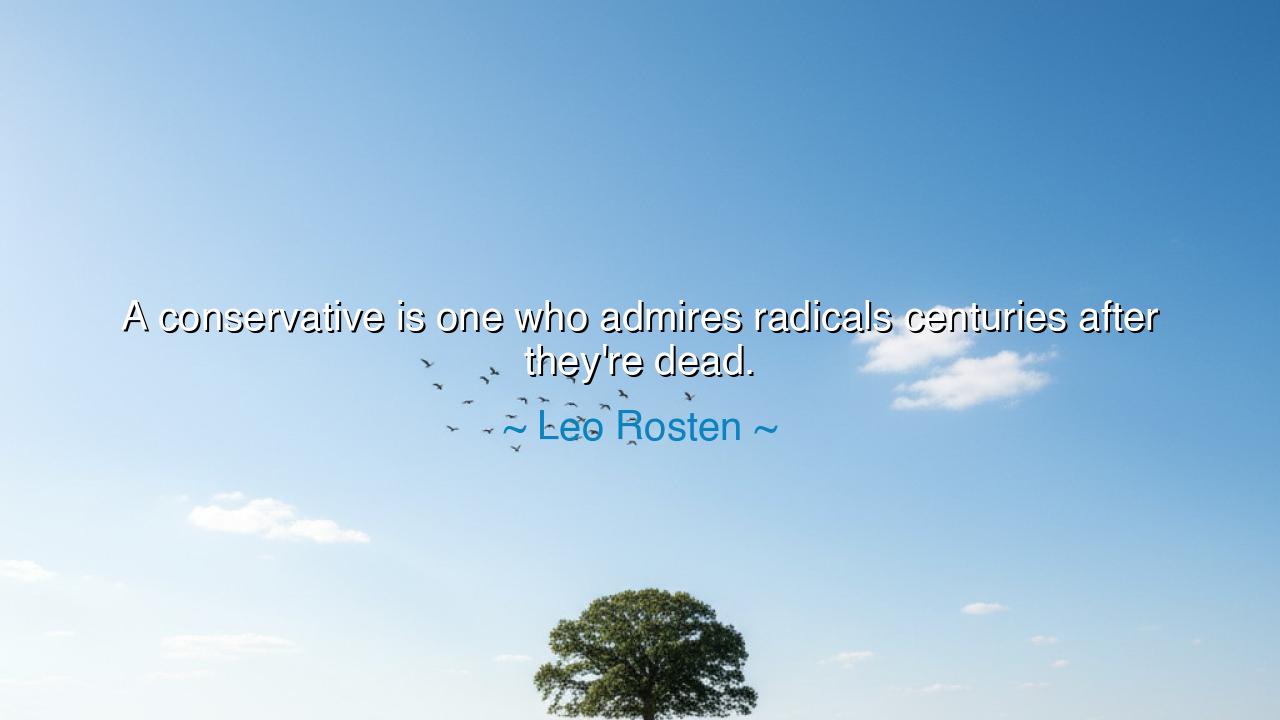
A conservative is one who admires radicals centuries after






The words of Leo Rosten — “A conservative is one who admires radicals centuries after they’re dead.” — shine with irony and insight, exposing the strange dance between tradition and change. Rosten, a humorist and social commentator, saw clearly how ideas once condemned as dangerous often become revered once time has softened their sting. What was once rebellion, shocking and unwelcome, later becomes enshrined as heritage, honored by the very conservatives who would have opposed it when it was new.
The meaning is layered with both humor and tragedy. The radical shakes the world, demanding freedom, justice, or transformation, and the conservative resists, clinging to the order that is. Yet centuries later, when the radical’s dream has triumphed and become the new foundation, the conservative praises him as a hero of the past. Thus, yesterday’s heretic becomes today’s saint, and what was once despised is later adored. Rosten reveals this paradox to remind us that time changes not only circumstances but also the judgment of men.
History gives many examples. Consider the American Revolution: men like Thomas Paine and Thomas Jefferson were branded dangerous, radicals who threatened the crown and the established order. Yet today, their words are quoted with reverence, even by those who call themselves conservative, though in their time such voices would have been silenced or punished. Or think of Galileo, condemned as a radical for declaring that the earth moves around the sun. Centuries later, even the Church that opposed him now honors him as a genius of science.
The irony runs deep. The conservative spirit seeks to guard the wisdom of the past, yet it often forgets that much of what it now guards was once the firebrand cry of radicals. Democracy, equality, free speech — all were once dangerous ideas. To admire them now, while resisting new reforms with the same fear, is to repeat history’s cycle endlessly. Rosten’s jest pierces this cycle, reminding us that what is radical today may be revered tomorrow.
Let this wisdom endure: be wary of scorning the radical, for he may be the ancestor of the truths your grandchildren will honor. The march of history is not halted by resistance; it is only delayed. Rosten’s words call to humility, teaching us that the values we treasure today were once seeds planted by those brave enough to defy the world. Thus, honor both the guardians of tradition and the prophets of change, for together they weave the tapestry of progress across the ages.






TLNhu Tam Le
This quote is interesting because it highlights how time can alter perceptions. Conservatives may reject radical ideas when they’re first introduced, but later, they might embrace them when there’s no longer a challenge to the system. Does this mean that people are more open to new ideas when the risks associated with them have diminished? Or does it reflect how history can reshape our views of what was once considered radical or controversial?
CQDien Chinh Quoc
I think Leo Rosten's quote offers an ironic take on how society deals with change. It suggests that conservatives may have an easier time appreciating radical ideas once they're no longer a threat to the established order. This raises an important question—do we, as a society, only truly appreciate change when it’s safe to do so? How often do we resist progress, only to later accept it when it's no longer threatening?
VA01 Cao VIET ANH
This quote seems to comment on the paradox that many radicals, when alive, are seen as disruptive, yet after they pass, their ideas are often romanticized. It makes me wonder, is this just the way history works, or is there something about the fear of change that makes us more accepting of new ideas once they’ve had time to settle? What’s the balance between radical change and conservative preservation?
NLNgo ngoc lan
I find this quote both clever and thought-provoking. It seems to suggest that once radical ideas are no longer a threat to the current order, they can be admired from a safe distance. But what does this say about the nature of change and progress? Are we more open to new ideas when they no longer challenge our own positions or values? It also makes me wonder if this pattern exists beyond politics.
Pphongnguyen2004
This quote seems to suggest that conservatives often hold a more idealized view of radicals once they’re no longer around to challenge the status quo. It raises an interesting point about how we view controversial figures after time has passed. Why is it that we often revere people after they’ve died, when their ideas were perhaps too radical or unacceptable in their time? Is this a reflection of how society views change?